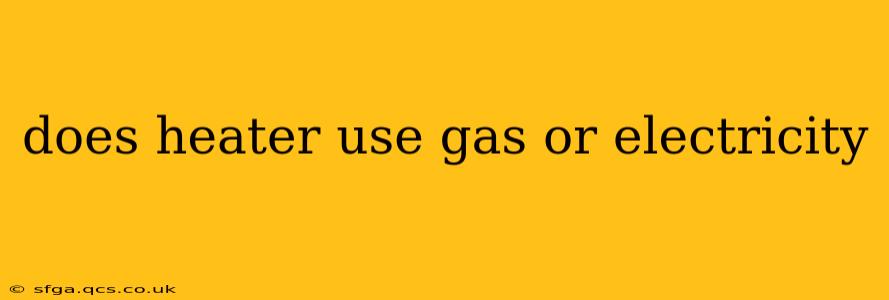Does a Heater Use Gas or Electricity? Understanding Heating System Fuel Sources
The simple answer is: it depends! Heaters can use a variety of fuel sources, most commonly gas (natural gas or propane) or electricity. The type of fuel used depends on several factors, including the specific heater model, the availability of utilities in your location, and your personal preferences. Let's delve deeper into the specifics.
What Types of Heaters Use Gas?
Many homes rely on gas heaters for their primary heating source. These systems offer several advantages, particularly for larger spaces. Common gas heaters include:
- Furnaces: These are central heating systems that distribute warm air throughout your home via ductwork. They're highly efficient and can heat a whole house effectively.
- Gas fireplaces: While providing ambiance, gas fireplaces also offer supplemental heating, warming a specific room or area.
- Gas space heaters: Portable options, these heaters can provide quick and localized heating but generally aren't as efficient as central systems.
- Tankless water heaters: Though not strictly a space heater, a gas tankless water heater provides hot water on demand, which can contribute to a warmer home environment.
Advantages of gas heating:
- High efficiency: Gas furnaces, especially newer models, often boast higher efficiency ratings than electric heaters.
- Powerful heating: Gas systems typically provide more powerful and consistent heating, particularly in colder climates.
- Lower operating costs (potentially): In some regions, natural gas is less expensive than electricity, leading to lower heating bills.
Disadvantages of gas heating:
- Installation costs: Installing a gas furnace or other gas heating system can be more expensive than an electric system.
- Safety concerns: Gas leaks pose a significant safety risk, necessitating regular maintenance and inspections.
- Environmental impact: Gas combustion releases greenhouse gases, contributing to climate change.
What Types of Heaters Use Electricity?
Electric heaters offer a clean and convenient alternative to gas, although they may not be as cost-effective in all situations. Several types of electric heaters exist:
- Electric baseboard heaters: These are commonly installed along walls and provide consistent, even heating in a room.
- Electric forced-air furnaces: These function similarly to gas furnaces but use electric resistance heating elements to warm the air.
- Electric space heaters: These portable units are ideal for supplemental heating in individual rooms. They come in various designs, including radiant, convective, and oil-filled models.
- Heat pumps: While technically using electricity, heat pumps are more efficient than standard electric heaters as they transfer heat from one area to another rather than generating it. They're becoming increasingly popular for their energy efficiency.
Advantages of electric heating:
- Clean and safe: Electric heaters produce no combustion byproducts, making them cleaner and safer than gas systems.
- Easy installation (generally): Electric heaters often require simpler installation, especially portable models.
- Precise temperature control: Electric heaters frequently offer more precise temperature control.
Disadvantages of electric heating:
- Higher operating costs (potentially): Electricity costs can be higher than gas, depending on your location and energy rates.
- Less efficient (generally): Compared to gas furnaces, many electric heating systems have lower efficiency ratings.
- Can increase electricity bills significantly: Depending on the climate and size of the house, operating electric heaters can increase electricity bills substantially.
What are the different types of electric heaters?
As mentioned above, electric heaters come in several types, each with its own advantages and disadvantages:
- Radiant heaters: These heaters use infrared radiation to warm objects directly, including people and furniture. They are often quick to heat a small area.
- Convective heaters: These heaters warm the air, which then circulates throughout the room. They are generally more efficient for heating a larger area than radiant heaters.
- Oil-filled radiators: These heaters use oil to retain heat and radiate it gently and evenly over a longer period. They provide a consistent, even warmth.
Each type of electric heater is best suited for different situations and preferences, and it's important to select the type that best meets your needs.
Which is cheaper to run: gas or electric heater?
The cost of running a gas versus an electric heater heavily depends on your location and local utility rates. In some areas, natural gas is significantly cheaper than electricity, making gas heating more economical. However, in other areas, electricity costs may be lower, resulting in electric heating being the more affordable option. Consider your local energy prices when making your decision. Also, the efficiency rating of the heater itself plays a crucial role—a highly efficient gas furnace might be cheaper to run than a less-efficient electric heater, even if the cost of the fuel itself is higher.
In conclusion, the best type of heater for your home depends on various factors. Carefully weigh the advantages and disadvantages of gas and electric heating systems, considering your budget, local energy costs, climate, and personal preferences to make an informed decision. Consulting with a qualified HVAC professional is always recommended before making significant heating system upgrades or installations.
